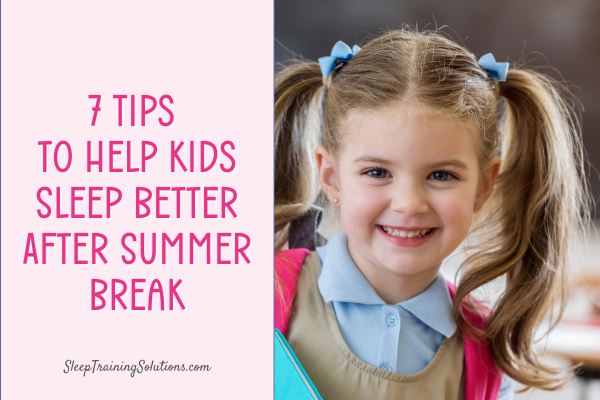Your child’s sleep during the HOLIDAYS!
[Updated 11/14/24]
Baby and Toddler Sleep at the Holidays
The holiday season is here, and with all the excitement of family gatherings, festive events, and seasonal fun, it can be tough to imagine how your child’s sleep schedule will survive the chaos. But don’t worry—there are simple, effective ways to keep your little one’s sleep on track while still having a blast during the holidays.
December is one of the busiest times of year, and when you're juggling holiday parties, family visits, and end-of-year preparations, it can feel like an impossible challenge to stick to your child’s usual sleep routine. But trust me—biting off more than you can chew can lead to overtired kids, missed naps, and a whole lot of sleepless nights. Luckily, with a little pre-planning, flexibility, and some realistic expectations, you can keep your child’s sleep in check and enjoy the festivities too!
Here are 9 strategies for managing your child’s sleep during the holidays, ensuring everyone stays well-rested and stress-free.
1. Stick to Your Normal Schedule…As Much As Possible
This one is key. The two biggest mistakes I see parents making around the holidays are skipping naps and pushing bedtime too late. And both of these lead to overtired, cranky kids who wake up early or in the middle of the night—leading to even more exhaustion.
A well-rested child is a happy child! If you’re headed out for an event, don’t skip naps to squeeze in extra fun. Car naps can be great if you’re on the go—especially if you time your car ride around their usual nap time. If that’s not possible, consider setting up a quiet spot at the event (a corner or bedroom with a pack-n-play or travel crib) where your child can catch a few zzz’s.
If you’re attending an event that’s running later than usual, keep in mind that the next 24 hours will likely feel “off” schedule-wise. It’s okay—don’t panic! Within a day or two, their sleep schedule will bounce back.
Pro Tip: If your child is already on an independent sleep routine, sticking to their usual sleep time won’t be as difficult. They’ll fall asleep on their own and stay asleep, even if you’re not right next to them. However, if your child needs a little more help getting to sleep or hasn’t mastered independent sleep yet, late nights might mean you’re the one trying to get them to sleep in a guest room while everyone else enjoys the party!
2. Choose Wisely—Don’t Over-Schedule Your Day
As much fun as it is to pack in all the holiday excitement, doing too much can lead to overstimulation and exhaustion. Let’s be honest—there’s only so much holiday cheer a toddler can handle in a single day! A gingerbread-making workshop in the morning, a visit to Santa in the afternoon, and a neighborhood holiday open house in the evening? That’s probably pushing it.
Instead, try to space out your family’s events and focus on one special outing per day. This way, your child can enjoy the fun without getting overtired. If there’s no set start time (such as with family gatherings), plan those activities around naps and bedtime whenever possible.
If you’re running errands—like a Costco trip—around nap time, remember that while it’s tempting to get those last-minute shopping items in, naps in the crib are going to be more restorative than any stroller or car nap. So when you can, try to keep the routine!
Pro Tip: If you need to skip an event or a party for your child’s sleep sake, don’t feel guilty. It’s okay to miss out on one thing for the sake of your child’s well-being. Think of it as a way to recharge for the next event.
3. Don’t Create a Sugar Monster
Holiday treats are everywhere, and while it’s tempting to let your child indulge in a cookie (or ten!), sugar can wreak havoc on your child’s sleep. If your little one is not used to sweets, introducing a sugary snack before bedtime can lead to a sugar high that makes it much harder for them to fall asleep.
To avoid this, set expectations before you even arrive at the party. For example, decide in advance that your child can have two cookies or one small piece of pie—and make it clear they can’t have more. The key is to avoid the constant sugar requests that often happen when there are treats everywhere.
Don’t forget about caffeine—especially if your child is usually caffeine-free. A soda or chocolate might sound tempting, but caffeine can disrupt their ability to fall asleep. And, if you’re breastfeeding, keep in mind that your caffeine intake can pass through breast milk, making your little one extra wired.
Pro Tip: If your child’s sugar intake is inevitable, balance it out with healthy meals and snacks during the day. This will help regulate their energy levels and make it easier to settle them down at bedtime.
4. Bring Bedtime to the Party
Late family events don’t have to throw off your child’s sleep schedule entirely. With a little creative planning, you can attend gatherings while still keeping bedtime on track.
• Set up a mini sleep space: Bring along a travel crib (this one is easy to set up, has sloped sides and can often be found for under $60!) along with a travel white noise machine (use the white noise, not surf sound!) and familiar bedtime books. Create a quiet, cozy sleep zone in a guest room or a quieter area of the house. This way, your child can rest peacefully, away from the noise and excitement of the party.
• Stick to your usual routine: Even though you’re in a different environment, try to stick to the bedtime rituals your child knows and loves. You probably won’t have a place to give a bath, but you can do a wipe down with a washcloth, read a couple of familiar board books, etc to maintain the familiar routine to signal to your little one that it’s time to wind down and go to sleep—no matter where they are.
• Use a monitor: If you want to stay in the loop while enjoying the party, bring a baby monitor with you (this one can be found for under $50 and has secure transmission without wifi). That way, you can keep an ear out for any wake-ups or concerns, ensuring your child’s sleep goes smoothly while still enjoying the festivities.
5. Don’t Skip the Bedtime Routine
I cannot stress this enough: Don’t skip the bedtime routine! While it can be tempting to rush things to get to that holiday party or to wrap gifts, maintaining your child’s bedtime routine is one of the best ways to help them sleep well. Even if it’s a shortened version, this routine helps your child feel secure and signals that it’s time to sleep.
Here’s how to make sure your child’s bedtime routine stays intact:
· Keep it simple. Even if you’re at a holiday gathering and need to cut things short, try to keep some of the familiar bedtime steps.
· Don’t rush bedtime. As tempting as it may be to hurry through the bedtime routine, rushing can lead to overstimulation, making it harder for your child to settle down. Give them the time they need to wind down and feel relaxed.
· Make the routine adaptable. If you’re staying somewhere else, try to adapt your child’s bedtime routine to the new environment. Bring their favorite sleep sack, stuffed animal, or sound machine to help them feel comfortable in an unfamiliar space.
Pro Tip: When possible, try to keep bedtime predictable. Even if it’s a little later than usual, try to stick with the usual “wind-down” process. If you find that rushing around causes your child to get overstimulated, you may want to consider having an early exit strategy from events. Instead of staying 10 extra minutes chatting, plan ahead and leave when you agreed to, so you can get home in a calmer state and not stress about missing out.
6. Consider Getting a Sitter
Sometimes, the best way to enjoy a party without worrying about bedtime is to hire a trusted sitter to stay with your child in their sleep space. This works well when you don’t want to stress about leaving early or dealing with the chaos of a party while also trying to manage bedtime.
Having a sitter means you can enjoy the event without worrying about when your child will fall asleep or keeping them quiet while you’re away. Plus, your child will feel more comfortable in a familiar space, sticking to their usual routine.
Pro Tip: When you hire a sitter, write down clear instructions on your child’s sleep routine—timing, steps of routine and what to do (and not to do). This way, they can ensure everything runs smoothly while you’re out enjoying the evening.
7. Travel Smart: Bring Sleep on the Road
Traveling to visit family over the holidays? Traveling with children doesn’t have to mean sacrificing good sleep habits. With the right tools and preparation, you can recreate your child’s sleep environment and they’ll be able to sleep anywhere.
Pack a “sleep kit”: Bring familiar items that promote sleep. This includes a portable white noise machine, blackout shades, your child’s favorite lovey or blanket (for children over 12 months), and a couple of their go-to bedtime books. The familiarity of these items helps signal that it’s time to sleep, even in a new environment.
Use portable nap solutions: Even when you're out and about, bring tools to make napping easier. A stroller with a built-in shade, a travel white noise machine, or even a cozy blanket can help your child rest in an unfamiliar space. If you're at a family member’s house, you’ll want to bring a portable travel crib to create a safe nap area.
Test travel gear in advance: If you’re using a new travel crib or sleep item (such as a portable bassinet or cot), test it at home first. This helps your child get used to it before sleeping in it during the trip.
Create a mini sleep space: If you’re staying in a shared space, try to find a space to set up a designated “sleep zone” where your child can have some quiet time before bed. You can use a bathroom, closet, or even a hallway to set up their sleep gear.
Plan travel and outings around nap windows: Try to schedule car rides or outings during your child’s natural nap time. This can help ensure they’re well-rested for the rest of the day. If you're visiting family, you might plan to travel during a nap to avoid disturbing their routine.
👉 For more in-depth tips on traveling with little ones, check out my Travel with Littles Guide (get $30 off using that link!), which includes packing checklists, travel hacks, how to manage early/late flights or road trips and other actionable tips!
8. Prioritize Sleep Training Before the Holidays
If your child is still struggling with falling asleep independently or tends to rely on you to soothe them back to sleep during the night, the holiday season may feel extra challenging. Imagine being at a family gathering or party and having to sneak away to a quiet room to help your child get to sleep, or worse, needing to hold and rock them for hours while everyone else is enjoying the party!
To avoid this, it’s a great idea to start working on sleep training before the holiday rush begins. Establishing solid sleep habits and helping your child become comfortable with falling asleep on their own will make a huge difference when you’re trying to balance all the holiday excitement and events. Independent sleep can help reduce the likelihood of bedtime becoming stressful when you're away from home or out of your usual routine.
It’s important to think about whether sleep training around the holidays is the right approach for your family. In my post Is Sleep Training Around the Holidays a Good Idea?, I explore the pros and cons of starting sleep training during the festive season, so you can decide what’s best for your family. If you’re worried about timing, my Timeline for Sleep Training + Holidays post gives a clear idea of when and how to plan your sleep training efforts to ensure it doesn’t interfere with your holiday plans.
Even if you’re just getting started, a few weeks of focus on improving your child’s sleep habits can make a big difference—and you’ll be able to enjoy the holidays more knowing your little one is well-rested.
9. Give Yourself Permission to Adjust Expectations and Be Flexible
As much as you might try to stick to a routine, the holidays are unpredictable. Unexpected changes—whether it’s staying out late, missing naps, or extra excitement—are bound to happen. The key is to remain flexible and give yourself grace.
If things don’t go according to plan, don’t stress. A little disruption here and there won’t ruin your child’s sleep habits in the long term. Holiday schedules can be hectic, so it’s okay to skip a nap or extend bedtime occasionally. Focus on getting back to your regular routine as soon as you can.
Balance is essential. If you go to a late party one night, adjust the next day with a more relaxed schedule to ensure your child gets the rest they need. And remember, it’s okay to let go of perfection. The holidays are meant to be fun, so don’t be too hard on yourself if your child stays up a little later than usual or misses a nap.
The best moments often happen when things don’t go as planned. Be kind to yourself and your child, and keep in mind that the holidays are about making memories—not stressing over every little detail.
Final Thoughts: Enjoying the Holidays with a Well-Rested Child
With a little preparation and flexibility, you can keep your child’s sleep on track and still enjoy the holiday season. However, these tips work best when your child has developed good sleep habits. If your child still relies on you to fall asleep or has inconsistent sleep patterns, it might be a bit more challenging to juggle everything. You could find yourself in a guest room, trying to comfort your child while everyone else is enjoying the party on the other side of the door!
If your child hasn’t yet mastered independent sleep, it’s not too late to work on it. Whether through my online baby sleep course (get 50% off this this link!) or personalized coaching, you can establish a sleep plan that works for your family before the holiday rush. That way, you can focus on fun, family, and memories—not the chaos of bedtime!
Happy Holidays—and restful nights ahead!
Baby Sleep and Holiday Season
Related Posts:
This post is for informational purposes only and may not be the best fit for you, your child and/or your personal situation. It shall not be construed as medical advice. The information and education provided here is not intended or implied to supplement or replace professional medical treatment, advice, and/or diagnosis. Always check with your child’s physician or medical professional before trying or implementing any information read here.






